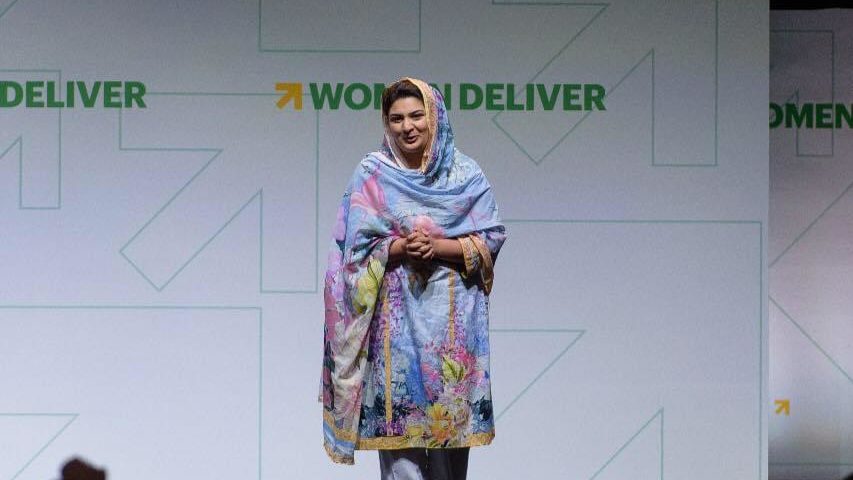Hadiqa Bashir’s Struggle Against Child Marriage: ‘One Human Being With Conviction Can Bring Real Change’ (with VIDEO)
Hadiqa Bashir was born in Pakistan’s Swat Valley in 2002. At the age of 11, after objecting to her grandmother’s attempt to marry her off, she started a campaign to discourage the practice of early and forced marriages. In 2014, she founded Girls United for Human Rights, an organization that raises awareness about the dangers of early and forced marriages and the benefits of education and health care, and provides access to legal and medical support for girls who face domestic abuse.
In 2015, Bashir won a Muhammad Ali Humanitarian Award for her work, and in 2016, she became the first Pakistani girl to receive the Asian Girls Human Rights Ambassador award.
In the latest episode of Facing the Middle East With Felice Friedson, Bashir speaks about the struggle to end early and forced marriages in Pakistan.
The Media Line: I really appreciate you taking the time to speak with me. It’s amazing work that you’re involved in.
Child marriages continue today in certain provinces in Pakistan. Hadiqa Bashir is joining us from the Swat Valley and has been courageous in trying to stop the tribal practice. Welcome!
Bashir: Thank you so much for having me!
TML: It’s a pleasure. How did you get involved in taking on the whole practice, the ancient practice of tribal marriage?
Bashir: When I was 7 years old, one of my friends told me that she’s getting married and all of us were really excited for her marriage, and we were excited for the marriage dress and for the jewelries and everything. So, we don’t know that she’s getting married and we don’t know the circumstances. We don’t know that what will happen in the future, and we don’t know that it is a big responsibility.
TML: Did you say 7 years old?
Bashir: So, her mother-in-law scolded us and told us that now she’s now a woman and that she will not play with you. So, after some time we arranged that she came to the school, but she was very pale and down. We asked from her what [had] happened, so she told us that her husband beat her with an iron wire. So, I was in shock at that time [about] what is happening, but unfortunately, I was not able to do anything for her. So, when I turned 11, a marriage proposal came for me. The man was a taxi driver and my family was ready for that proposal, and they were about to say yes for that proposal, but I was crying. I was crying to my father, that no, I don’t want to get married in this age, because I have some dreams. I want to continue with my studies. So, my father told me about the human rights and about the child marriage law. So, I bravely told my grandmother that if you got me married in this age, I will file a case on you in the court of law. So, my grandmother slapped me and said that if she’s talking… So, my father then convinced my family.
So, yes, I bravely told my grandmother that if you got mad, I would file a case in a court of law, so my grandmother slapped me.
But my father supported me and he convinced my family. So, I thought that since my family is educated, and child marriages which are enforced marriages are happening in this educated family, so for the illiterate, uneducated family – for them it is normal. So, I started working against early enforced marriages and I went door to door and talked about early enforced marriages that it effects a girl child, [her] mental health [and] physical heath. So, I started working against early enforced marriages. I used to [make] aware [to] people about the negative impact of enforced marriages.
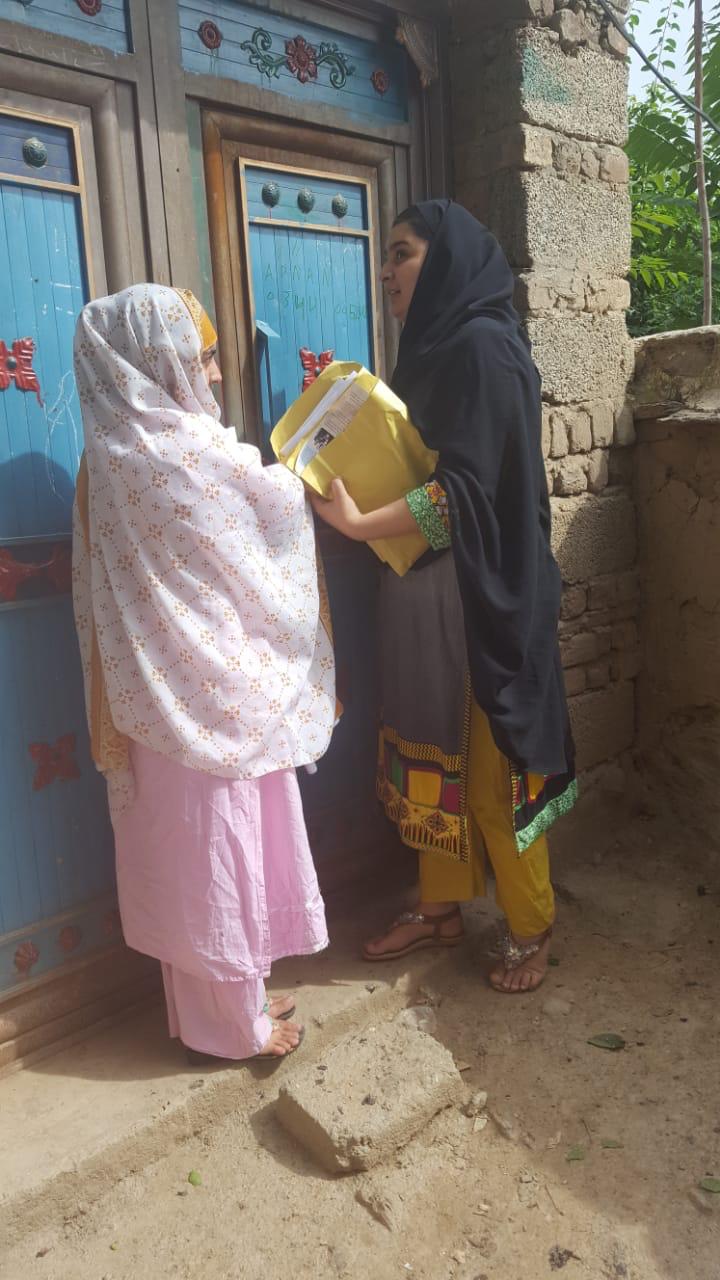
Hadiqa Bashir makes door-to-door visits to talk about the negative impact of early enforced marriages on girls’ mental and physical health. (Courtesy)
So firstly, people was like, she’s a kid, and why she’s [doing this], because she don’t know about your culture and it is what this culture is coming from decades. So, how she… Why she’s talking about these things? And they came to my home and they say to my father that why you, a girl, are talking about these things and who taught these things to [tell] her? And a lot of things were happening. The society started giving tests to my family also.
TML: Hadiqa, how old were you when you started Girls United for Human Rights?
Bashir: When I started Girls United for Human Rights, I was 13 years old.
TML: Wow! And did you get other young women to join you?
Bashir: Yes! But when I started, at that time I was alone. I was only one [person] and we used to… I was only one [person] who went door to door and I met with families and then I make a group, I make after four or five months. I make a group. We also take sessions with the imams, the prayer leaders so that they can talk about in their Friday sermons about the negative impact of value enforced marriages and about women rights. And also, we take sessions with the MNAs [Members of the National Assembly] MPs and we also engage media.
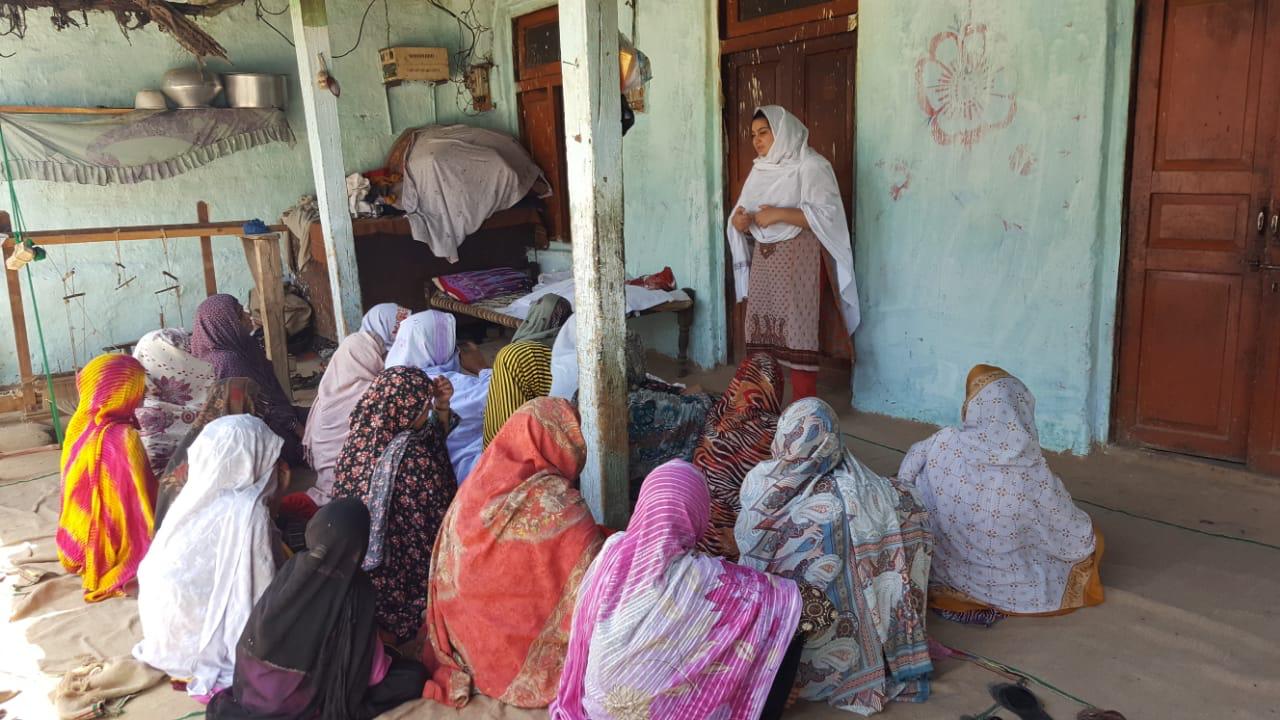
Bashir leads a community awareness session against early and forced marriages. (Courtesy)
TML: Is the government doing anything?
Bashir: Actually, the government is not. The government is more into roads and these things, even when we meet with the MNAs [Members of the National Assembly] MPs, they’re like, these are not issues, and they don’t hear youth problems, or like when we used to meet with MNAs [Members of the National Assembly] MPs, they were like, these are not my things to discuss about. And even they don’t know that even child marriages are happening on that time. The issue of honor killing was, day-by-day….
You also talk to them that these things are happening. So, they were like these are not our issue, and there are more problems. So, you know, they are not into much of these things, like where I’m living … so, they’re not into these things. They don’t even want to meet with us. When we want to meet with them, they don’t want to talk about these things. Also, we don’t get a positive response from their side, but we are trying to.
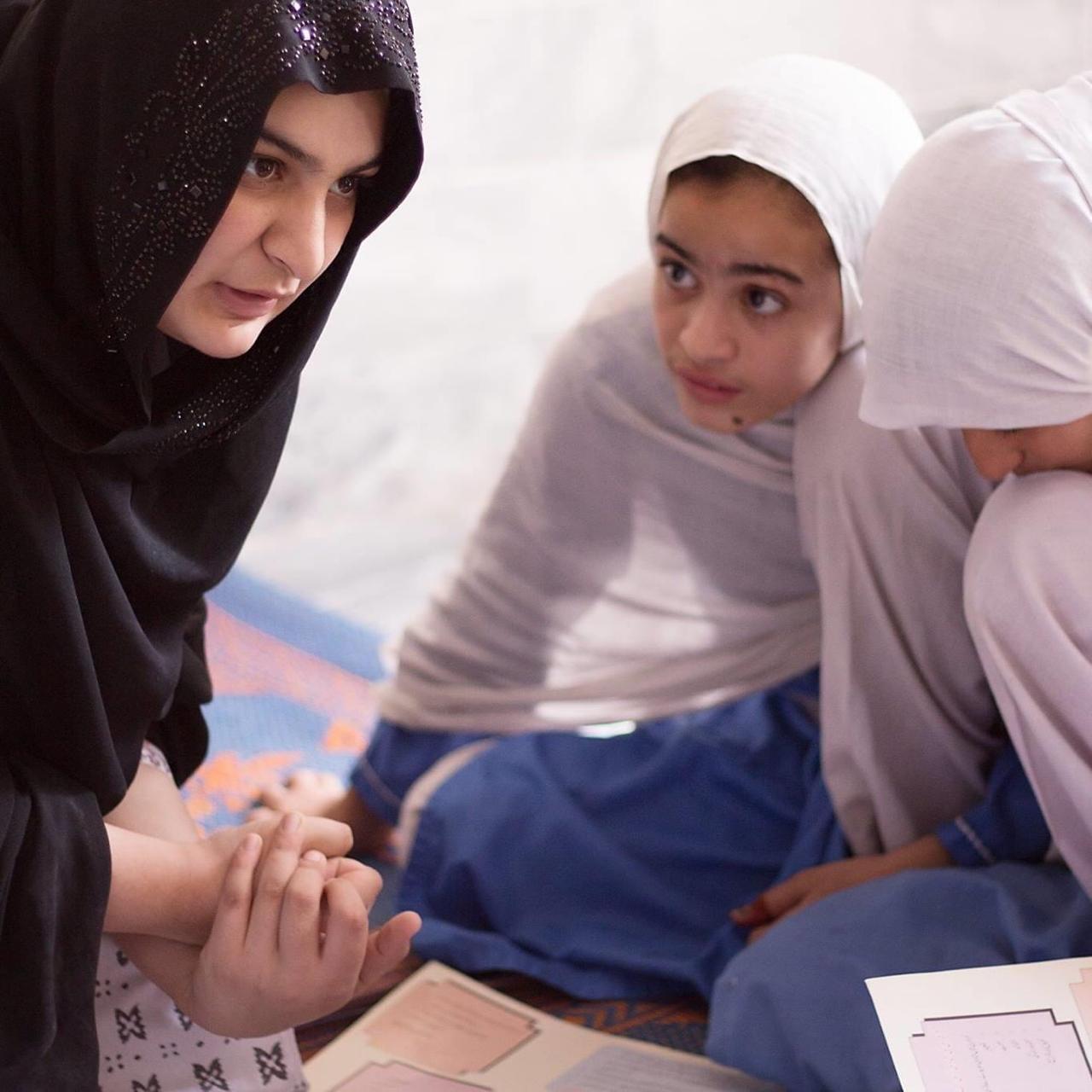
Hadiqa Bashir gives leadership training to girls. (Courtesy)
TML: What is the legal age of marriage in Pakistan?
Bashir: The legal age for a girl is 16, and for a boy is 18.
TML: But in many provinces this is not so.
Bashir: Yes!
TML: Do you know what the statistics are of child marriages today? What is the percentage?
Bashir: Yes, according to research back to 2018, it was 62% [that] got married before the age of 16, but this data was collected from the newspapers and some other news, and the work we are doing visiting door to door, so this data was locally collected. There are some girls that get married at 16 and then others who get married before the age of 12. So, in the Swat Valley, in that area, the girls get marriage in the age… It’s normal for them.
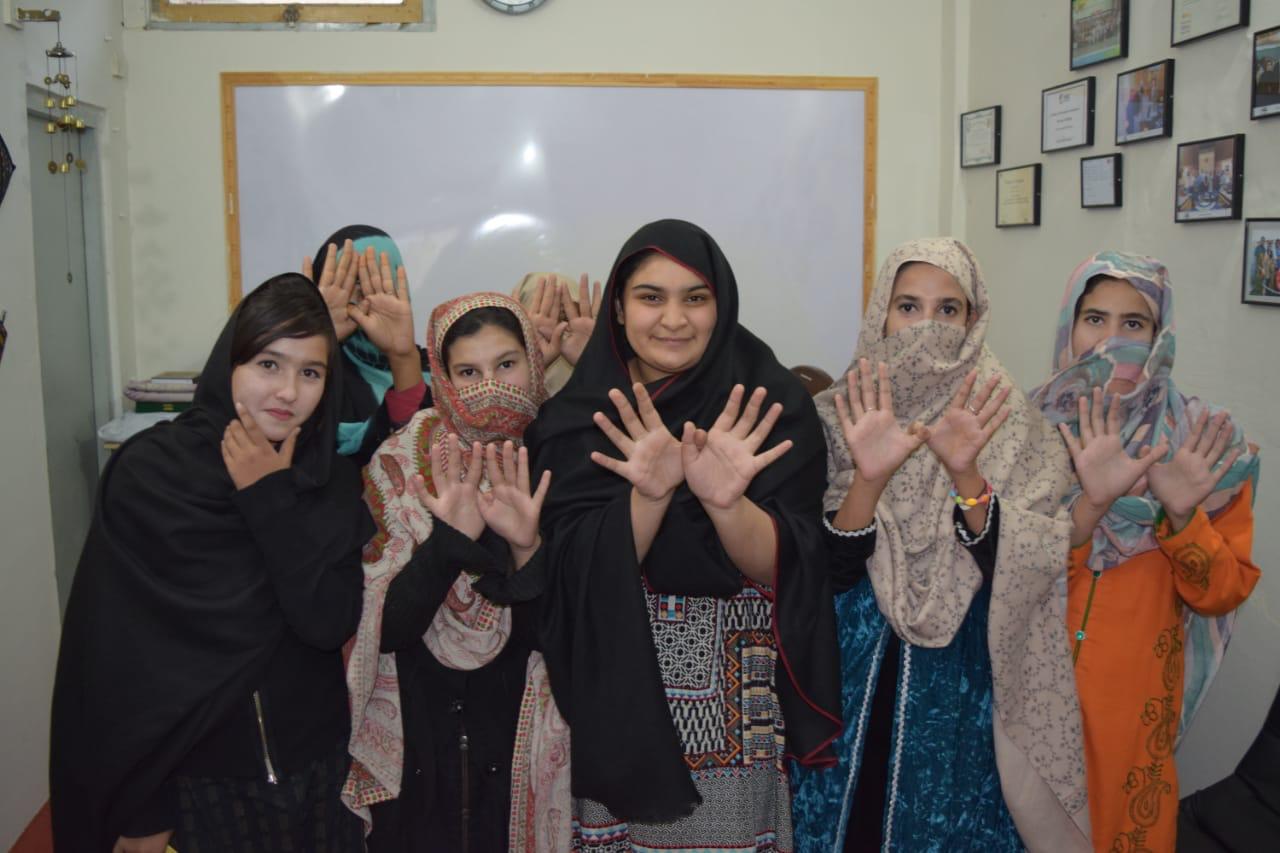
Hadiqa Bashir with group members. (Courtesy)
Bashir: They’re not doing the education.
Bashir: The girls are getting married before the age of 16, and in the Swat Valley area, they get married in the age of 12 years [and before]. Like they get married at the age of 9, 10, 11 years.
TML: Where is that?
Bashir: In Swat.
TML: Only Swat [Valley] or elsewhere?
Bashir: Yes!
TML: Only Swat.
Bashir: Actually, our focus is Swat [Valley], because yes, we are now working in Swat [Valley], and I’m living in Swat [Valley], so I know more about Swat [Valley]. And we didn’t work in the other areas yet, but we have in Pakistan, in the other cities, in the other places, child marriages happening, but now we are just working in Swat [Valley]. The focus is Swat [Valley].
So, the girls I was talking about, the girls get married between [the ages of] 9 and 12 sometimes. So, the reason that their families do that is out of poverty and a lack of awareness. It’s considered a tradition and that’s why they are practicing it.
TML: Are the men helping you? Are the men getting behind you educating about this issue?
Bashir: Yes, we also have made men and wives group, so there are also some men, because you can’t make a change without the men. Men are important also in this campaign, because we need to have change [from] both mindsets – the female and the male; both sides. So, we have to work with the male also; women and men together.
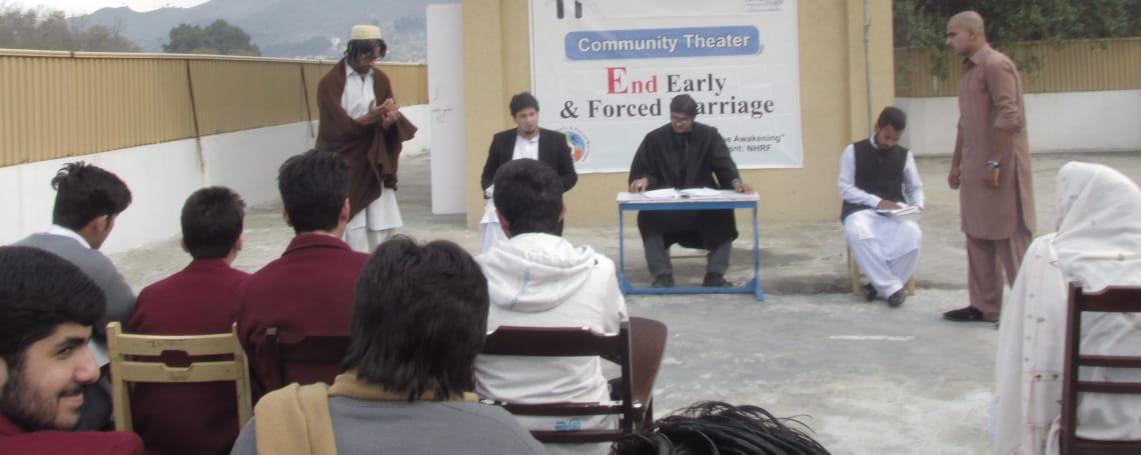
A community theater session helps to raise awareness among both boys and girls. (Courtesy)
TML: What is the population of Swat [Valley]?
Bashir: I don’t know exactly.
TML: In your spare time you are going to college. What are you studying?
Bashir: So, I am doing sociology B.S. here in Swat [Valley]. I am doing that nowadays. I am the first semester of sociology, B.S. Doing here at Jahanzeb College.
TML: Are you under threat? Have you been threatened by the Taliban? Do you feel you are safe or have you had threats?
Bashir: Yes, I have gotten threats so many times from the community; from some people. For some time, I have stopped my work, because the threats were more to my family. I stopped my work for some time and then I started my work [again], but I didn’t give up and then I started my work again.
TML: When you go to school, when you go to college, do you need to have a guard?
Bashir: No, I don’t have guards.
TML: You’ve been given several awards, and you were also nominated for the Child Peace Prize as well, twice.
Bashir: Yes!
TML: How does that feel?
Bashir: You know, it feels good, but for many people they think it’s so hard for me, but I think that that is my outreach to the globe, my outreach to the world, that I say to the world that this is not just the issue of Pakistan. This is not just happening in Swat [Valley], but this is happening all over the world. But people ignored it. This is my advice that reached to the whole world and then people hear that yes, things are happening in [the] Swat [Valley] and in the other cities and the other countries also. So, an award means for me otherwise, is reaching more and more to people.
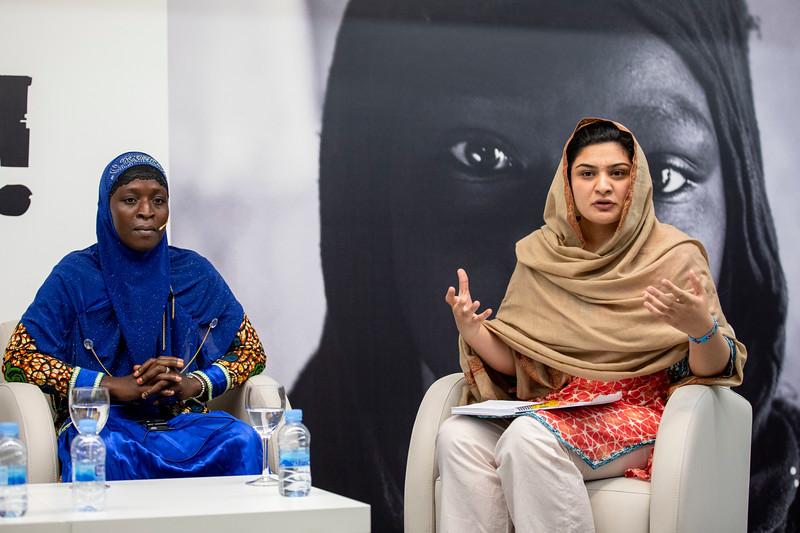
Hadiqa Bashir speaks at a conference in Spain. (Courtesy)
TML: There are still honor killings that go on in Pakistan, too.
Bashir: Yes!
TML: Do you feel that that has increased? Do you see more?
Bashir: The honor killings cases are rising day by day, but if you ask from the police and you ask for the records, so they say that no, there are just one or two cases in the records. So, according to the police records, and when the organization does the research and according the organization’s data, the honor killings are increasing day by day. So, they are the difference between the police records and the organization’s records, so they are a big difference.
TML: Who is your role model?
Bashir: Who is my role model? My role model is my father.
TML: Why?
Bashir: Because he did so many things for us. He is [an] activist. He is familiness. He has always supported women, so I have grown up seeing that he is always helping women, and he’s empowering women. He’s empowering my mother and my aunts, so he’s also supporting women. Those marginalized girls who are suffering, also gives me inspiration and power to continue my work.
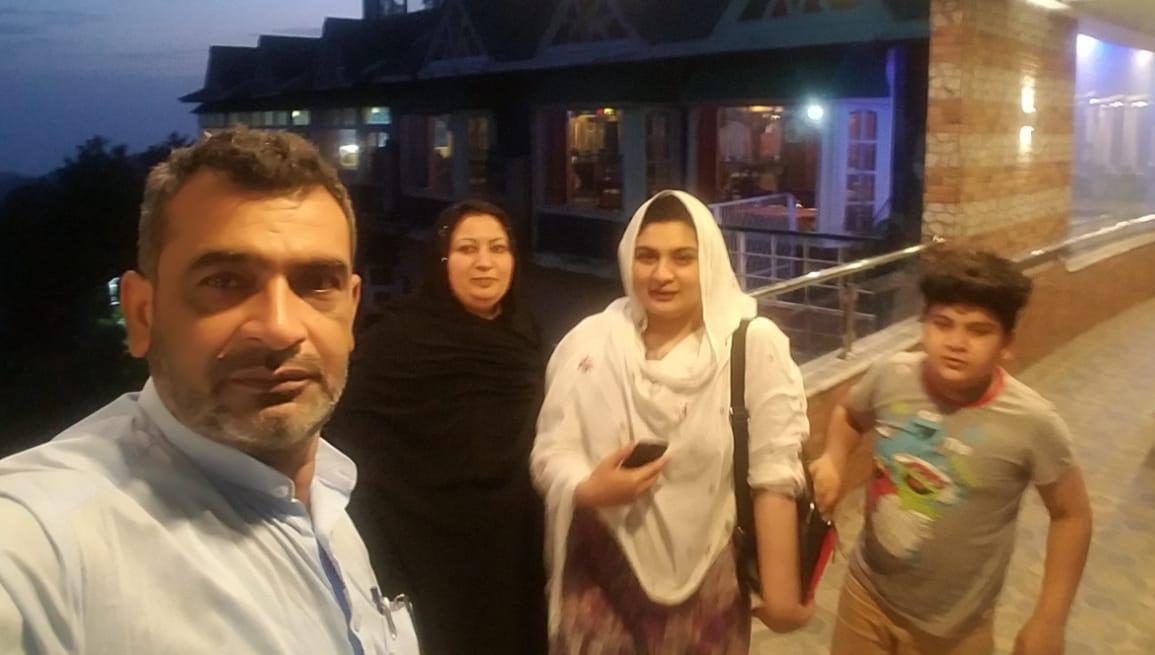
Bashir with her family, on vacation in Abbtobad, Pakistan. (Courtesy)
TML: What is your wish for International Women’s Day?
Bashir: My wish is that all girls are getting [an] education and all women are empowered and they have their rights like men have. My message for all the women is that one human being with conviction can bring real change.
TML: What are your dreams for yourself looking into the future?
Bashir: OK, so my dream is not for myself, but my dream is to see the society where there is a peace where women [and] girls are getting their education instead of getting married in the early enforced marriages, and they are more empowered.
TML: Hadiqa Bashir, you are an inspiration and quite a pleasure to speak with you. I wish you a lot of success that you are able to help eradicate child marriage.
Bashir: Thank you!
TML: Many thanks!
